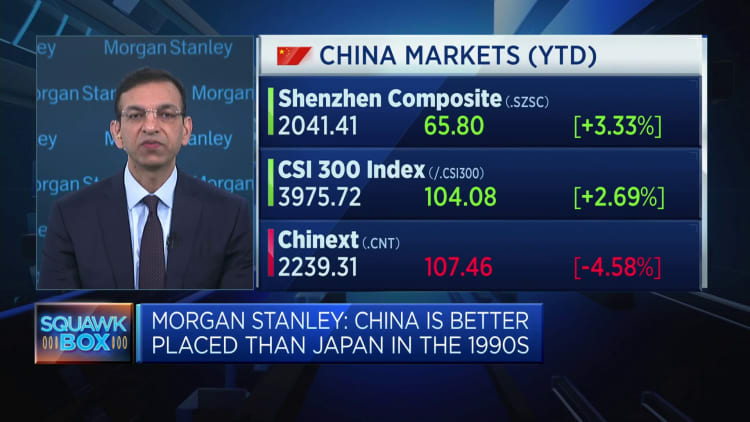[ad_1]
A woman walks at the Bund in front of the financial district of Pudong in Shanghai, China.
Aly Song | Reuters
BEIJING – China’s economy is running into more challenges.
Credit data for July released Friday showed a slump in demand from businesses and households to borrow money for the future. Real estate problems persist with once-healthy developer Country Garden now on the brink of default. Consumer sentiment is weak.
“The weak July credit data suggest the downward spiral of the property sector continues, and worsening geopolitical tensions add to the uncertainty,” Lu Ting, chief China economist at Nomura, and a team said in a report Friday.
“In Japan during the 1990s, corporates might have paid down their debt to improve their chances of survival, but in today’s China, corporates and households are cutting their borrowing due to a lack of confidence (and trust),” the report said.
All the factors just cannot mask how weak credit demand is and how low risk appetite is.
Xiangrong Yu
chief China economist, Citi
New local currency bank loans plunged by 89% in July from June to 345.9 billion yuan ($47.64 billion), less than half the 800 billion yuan analysts had forecast in a Reuters poll.
The July new yuan loan number was the lowest since late 2009, according to Reuters.
Those figures “should mark a low” since policy moves in June could have moved up some demand, Xiangrong Yu, chief China economist at Citi, and a team said in a note.

“Yet all the factors just cannot mask how weak credit demand is and how low risk appetite is,” the analysts said, noting expectations for rate cuts by the end of September. Without such cuts, they expect a greater risk that China misses its growth target of around 5% this year.
On Tuesday, China is set to release July economic data that’s expected to show no change from June in the pace of growth for industrial production and fixed asset investment, according to a Reuters poll.
Retail sales are expected to rise 4.7% year-on-year pace in July, slightly faster than in June, the poll showed.
Real estate drag
China’s massive real estate sector, where the majority of household wealth is parked, has reemerged as an area of concern that it could drag down the broader economy.
Last week, the company missed coupon payments on two U.S. dollar-denominated bonds, according to Reuters.
Country Garden’s U.S. dollar bonds account for just under half of outstanding high-yield U.S. dollar-denominated bonds, according to Goldman Sachs analysis.
China U.S. dollar bonds that are of investment grade account for 43% of the total, the analysis showed.
“Given that the majority of [high-yield] developers have either defaulted or conducted bond exchanges, we believe rising stresses amongst the remaining [high yield] developers are unlikely to have broader impact on the offshore bond market,” the Goldman analysts said in a report Friday.
“We believe of greater concern is whether rising stresses will spillover to [investment grade] developers, most of whom are state owned enterprises [SOEs].”
The more the government tries to help the real estate industry, the longer it takes for the industry to find a reasonable bottom.
Louis Lau
Brandes Investment Partners
State-owned companies have generally found it easier to obtain loans in China, where state-owned banks dominate. State-owned developers have also fared better in terms of recent sales than non-state-owned developers, data show.
However, China’s entire real estate sector still needs to contract by about 10 percentage points to reach a similar level of GDP contribution as Japan or South Korea, said Louis Lau, director of investments and emerging markets portfolio manager at Brandes Investment Partners.
He pointed out that while real estate has contributed to about 30% of GDP in China, that share is in the lower 20 percentage points in South Korea and Japan.
In 2020, Beijing began an earnest crackdown on developers’ high reliance on debt for growth. Authorities have eased their stance in recent months, with a notable shift in late July, but stopped short of large-scale stimulus.
“The more the government tries to help the real estate industry, the longer it takes for the industry to find a reasonable bottom,” Lau said.
He is underweight China, with selective investments in some consumer names and industries he expects will outperform.
[ad_2]

